人教新目标八上 unit 9 Can you come to my party?单元复习课件(共28张PPT)
文档属性
| 名称 | 人教新目标八上 unit 9 Can you come to my party?单元复习课件(共28张PPT) | 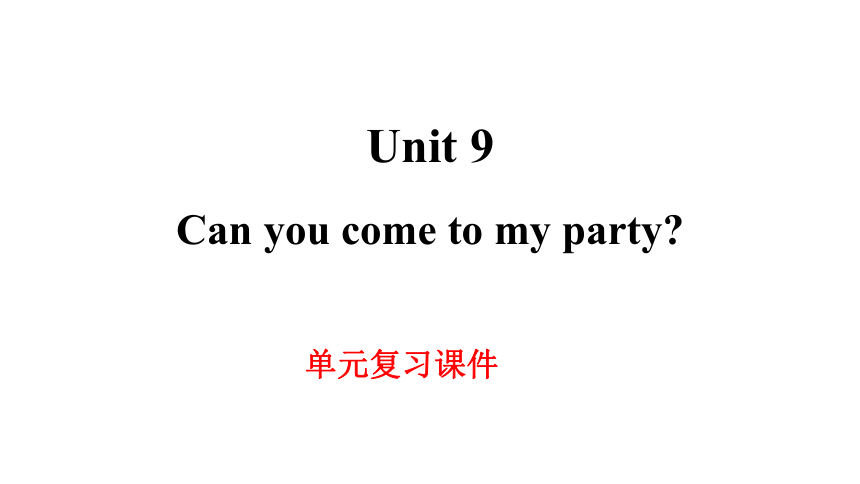 | |
| 格式 | pptx | ||
| 文件大小 | 614.6KB | ||
| 资源类型 | 教案 | ||
| 版本资源 | 人教新目标(Go for it)版 | ||
| 科目 | 英语 | ||
| 更新时间 | 2023-12-28 15:45:03 | ||
图片预览

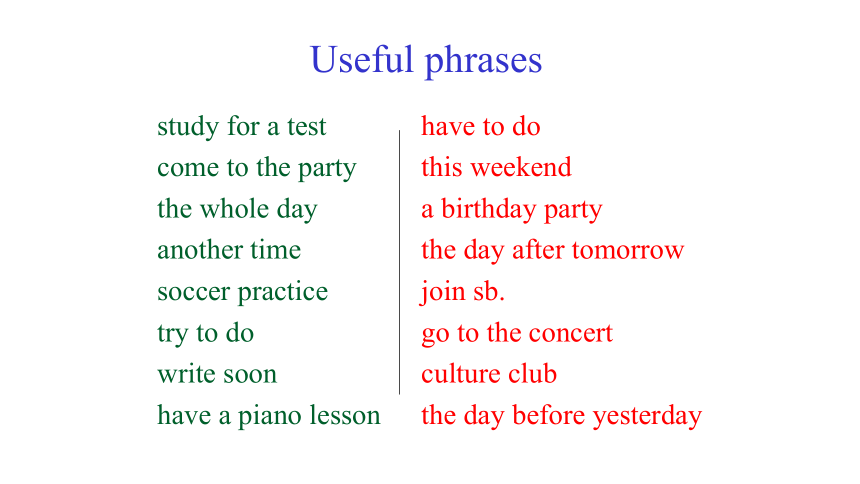
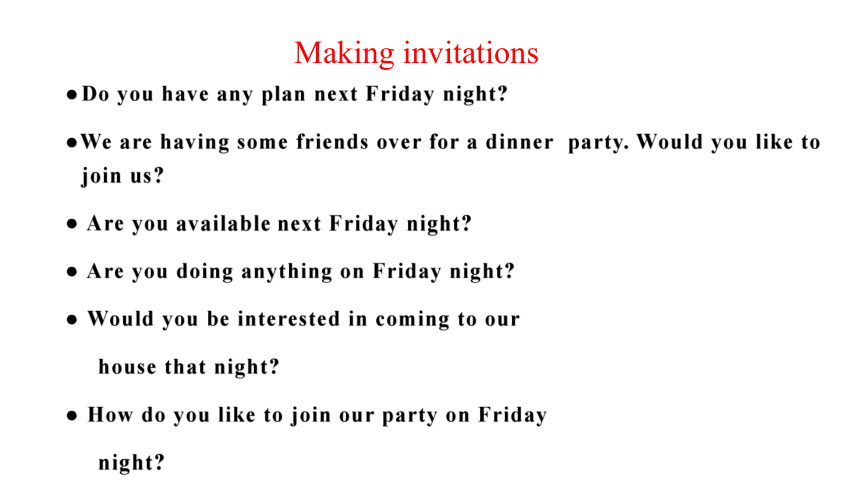
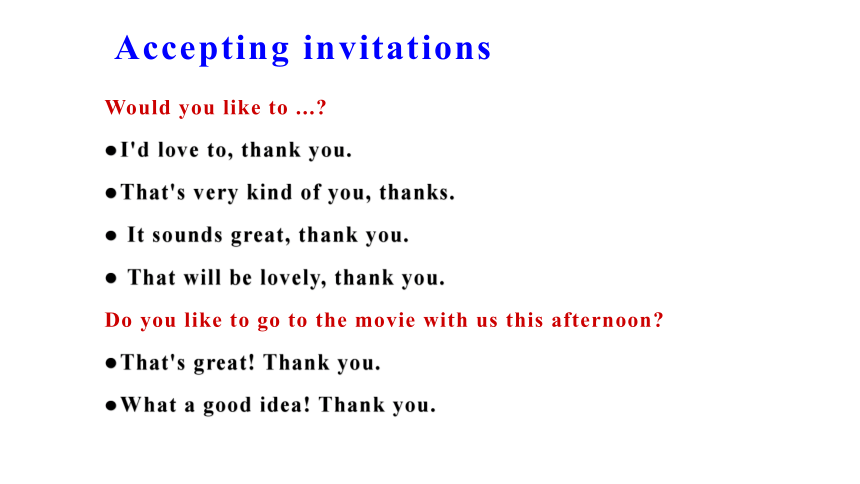
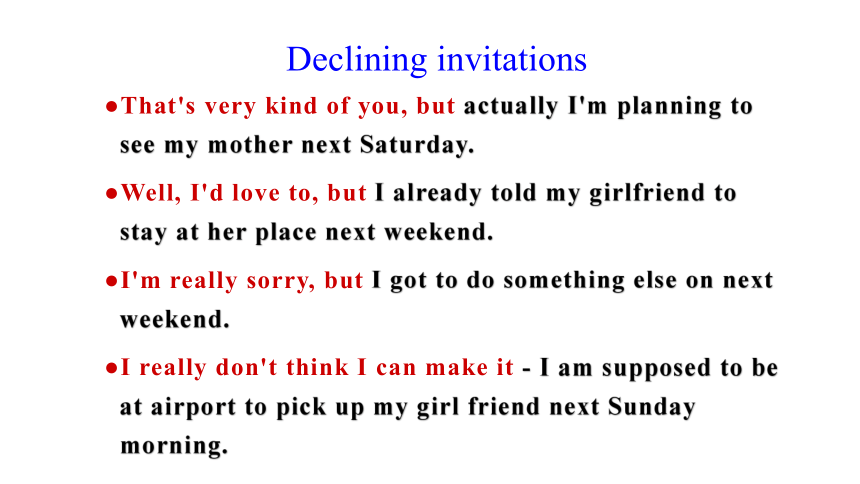
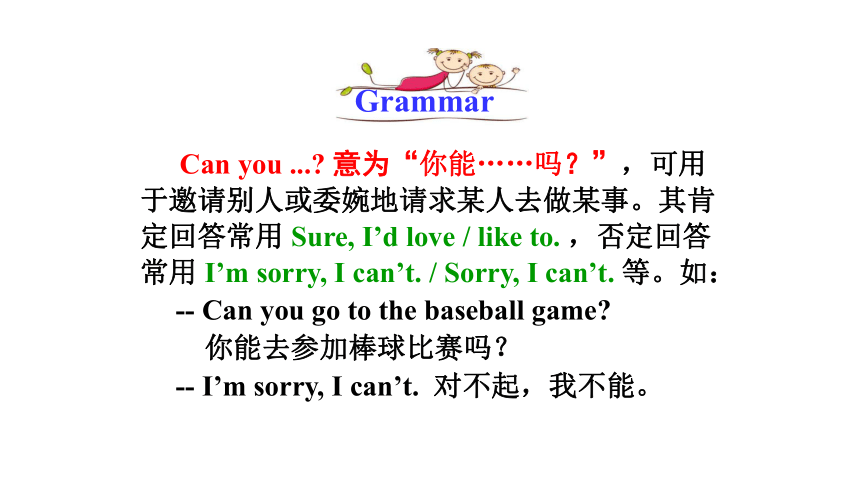
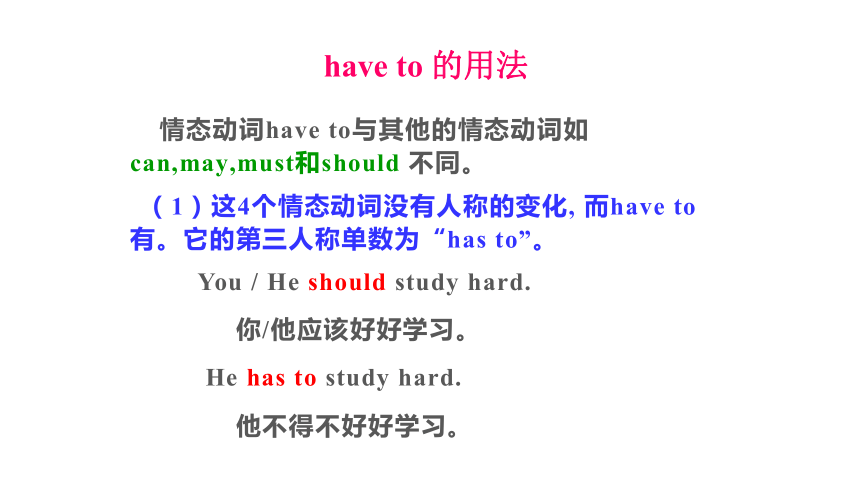
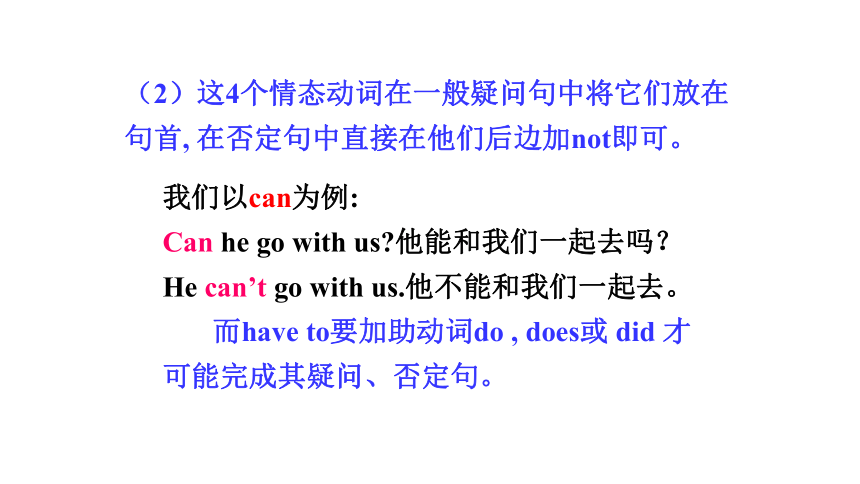
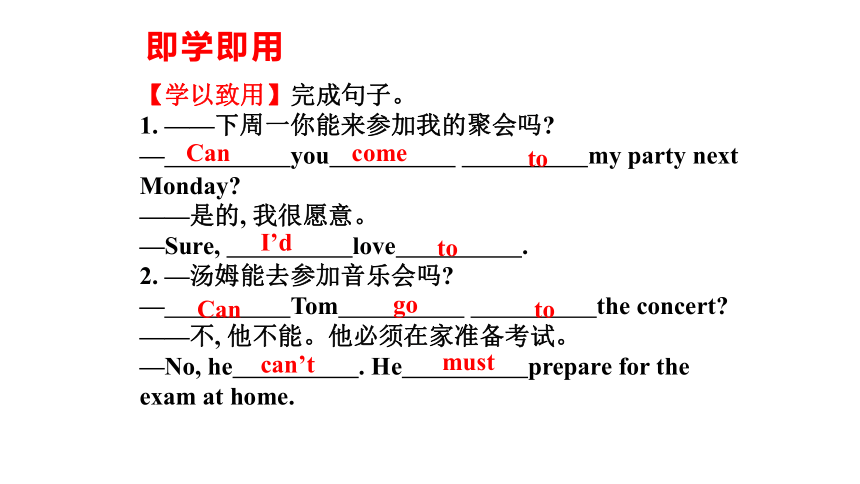
文档简介
(共28张PPT)
单元复习课件
Unit 9
Can you come to my party
八年级英语上(RJ)
教学课件
Useful phrases
study for a test
come to the party
the whole day
another time
soccer practice
try to do
write soon
have a piano lesson
have to do
this weekend
a birthday party
the day after tomorrow
join sb.
go to the concert
culture club
the day before yesterday
Do you have any plan next Friday night
We are having some friends over for a dinner party. Would you like to join us
Are you available next Friday night
Are you doing anything on Friday night
Would you be interested in coming to our
house that night
How do you like to join our party on Friday
night
Making invitations
Accepting invitations
Would you like to ...
I'd love to, thank you.
That's very kind of you, thanks.
It sounds great, thank you.
That will be lovely, thank you.
Do you like to go to the movie with us this afternoon
That's great! Thank you.
What a good idea! Thank you.
That's very kind of you, but actually I'm planning to see my mother next Saturday.
Well, I'd love to, but I already told my girlfriend to stay at her place next weekend.
I'm really sorry, but I got to do something else on next weekend.
I really don't think I can make it - I am supposed to be at airport to pick up my girl friend next Sunday morning.
Declining invitations
Can you ... 意为“你能……吗?”,可用于邀请别人或委婉地请求某人去做某事。其肯定回答常用 Sure, I’d love / like to. ,否定回答常用 I’m sorry, I can’t. / Sorry, I can’t. 等。如:
-- Can you go to the baseball game
你能去参加棒球比赛吗?
-- I’m sorry, I can’t. 对不起,我不能。
Grammar
情态动词have to与其他的情态动词如can,may,must和should 不同。
(1)这4个情态动词没有人称的变化, 而have to有。它的第三人称单数为“has to”。
You / He should study hard.
你/他应该好好学习。
He has to study hard.
他不得不好好学习。
have to 的用法
(2)这4个情态动词在一般疑问句中将它们放在句首, 在否定句中直接在他们后边加not即可。
我们以can为例:
Can he go with us 他能和我们一起去吗?
He can’t go with us.他不能和我们一起去。
而have to要加助动词do , does或 did 才可能完成其疑问、否定句。
【学以致用】完成句子。
1. ——下周一你能来参加我的聚会吗
— you my party next Monday
——是的, 我很愿意。
—Sure, love .
2. —汤姆能去参加音乐会吗
— Tom the concert
——不, 他不能。他必须在家准备考试。
—No, he . He prepare for the exam at home.
即学即用
Can
come
to
I’d
to
Can
go
to
can’t
must
3. ——南希能跟我们一起去看电影吗
— Nancy to the movies with us
——当然, 我想她很愿意。
—Sure, I think she’d .
4. ——星期三他们能跟我们一起踢足球吗
— they soccer with us on Wednesday
——是的, 他们能。
—Yes, they .
5. ——今天晚上你能和我一起逛逛吗
— hang out with me this evening
——我恐怕不能。我得在家帮助我父母。
— . I help my parents at home.
Can
go
love/like
to
Can
play
can
Can
you
I’m
afraid
not
have
to
have to 与 must
二者都有“必须”之意,但 have to 表示“客观上的需要”,有人称和时态的变化,否定形式为 don’t / doesn’t / didn’t have to (没必要);must 表示“主观上的要求”,无人称和时态的变化,否定回答一般用 needn’t 或 don't have to (不必)。mustn’t 表示“禁止”。如:
比一比
We have to wear warm clothes in winter.
冬天我们不得不穿上暖和的衣服。
(客观需要)
I must finish my homework first before I watch TV.看电视前我必须先完成作业。
(主观要求)
You don't have to tell him about it.
你不一定要把此事告诉他。
You mustn't tell him about it.
你一定不要把这件事告诉他。
—Must I be home before eight o’clock
8点之前我必须回家吗?
—Yes, you must.
/ No, you needn‘t. / No, you don’t have to.
是的,必须回家。/不,不必。
习作在线
Mike邀请Henry下周六去他家,但Henry那天很忙,不能赴约。假如你是Henry,请根据所给图片提示,写一封信回复Mike,说明你不能赴约的原因。信的开头和结尾已经给出,词数不少于70。
此篇作文是一篇辞谢信,谈论谢绝邀请的理由。结合图片所提供的信息,准确描述图片内容,使得理由表述充分。
根据上面的分析我们要在头脑中明确以下几点:
(1)弄清图片内容,准确把握每幅图片的主题内容。
(2)充分利用汉语提示,这些提示词能够帮助理解图意,注意围绕这些重点词语组织材料。
思路点拨
Hi Mike,
Thanks for asking me to your home, but I’m sorry I can’t visit you next Saturday. I’ll be busy that day. In the morning, I have to do my
homework. In the afternoon, I am having soccer
training with the school team. In the evening,
I’m going to the movies with my friends. There is
a new movie. I can’t miss it. Can you watch it
with us next Saturday evening
Write soon.
Henry
范文赏析
Language points
another adj. 又一的;再一的
I want a sweater, but this one is too small. Could you show me another one
我想买一件毛衣,但这件太小了。你能给我再拿一件吗?
another pron. 另一个,别个;再一个
This boy is very smart; he may be another Edison. 这男孩很聪明,他可能成为另一个爱迪生。
Another supermarket opened last week. 上星期又有一家超级市场开张了。
1. until conj. & prep. 到……时;直到
not … until 直到……才……
Sam isn’t leaving until next Wednesday.
萨姆直到下周三才离开。
I didn’t finish my homework until my mother came back.
直到我的妈妈回来我才完成我的家庭作业。
2. hang 悬挂;垂下; 过去时 hung
hang out 闲逛
I often hang out with my friends on weekends.
周末我经常和我的朋友们闲逛。
1.He didn’t come back home (直到) 11:00 last night.
2.The boy had the (流感).His father took him to the hospital.
3.We are going to have an (考试) tomorrow.
until
flu
exam
根据句意、首字母或汉语提示完成句子。
4.I must go now.I have to c the train at 2:30 p.m.
5.—Can you go to the movies with me this Sunday
—I’m sorry.I’m not a .
6.I’m busy now.Maybe we can go to the movies a time.
atch
vailable
nother
Language points
1. bring v. 带来
Can you bring me an English dictionary
你能给我带来一本英语字典吗?
bring 与take 的区别:
Bring your homework here, and take the book away.把你的作业拿过来,把这本书带走。
bring 指带到说话者这来,通常与here搭配,而take则指从说话者这带走,通常与away 连用。两者方向相反。
2. prepare v. 准备
My mother is preparing dinner when I get home every day.每天我回家的时候我妈妈总是在准备晚饭。
Her husband is preparing the food.
她丈夫正在准备食物。
Students are preparing for the test.
学生们正在为考试做准备。
They are busy preparing to go on holiday.
他们正在忙着准备休假。
3. surprised adj. 惊奇的;感觉意外的
Are you surprised to see him alive
你看到他还活着很惊奇吗?
与surprised 有关的用法:
①I’m surprised at the surprising news.
我对这个令人惊讶的消息感到很吃惊。
②To my surprise, he left without leaving a word.令我惊奇的是,他一声不响地离开了。
③He looked at me in surprise.他惊奇地看着我。
4. so that 以便于;目的是
He turned up the radio, so that everyone could hear the news. 他调大收音机的音量,以便所有人能听到这个消息。
1. I’m glad that he accepted the (invite).
2. All of us are making (prepare) for the end-of-year party.
3. They’re (take) a trip to Hainan during the winter vacation.
4. My uncle is looking forward to (find) a good job soon.
5. Ms. Lee went out of the room without
(say) anything.
用所给词的适当形式填空
invitation
preparations
taking
finding
saying
1. The girl saved every coin she could buy her mother a present on Mother’s Day.
A. if B. in order to C. so that D. because
2.I had too much work to do last night. I didn’t go to bed 11o’clock.
A. in B. until C. for D. when
C
B
单元复习课件
Unit 9
Can you come to my party
八年级英语上(RJ)
教学课件
Useful phrases
study for a test
come to the party
the whole day
another time
soccer practice
try to do
write soon
have a piano lesson
have to do
this weekend
a birthday party
the day after tomorrow
join sb.
go to the concert
culture club
the day before yesterday
Do you have any plan next Friday night
We are having some friends over for a dinner party. Would you like to join us
Are you available next Friday night
Are you doing anything on Friday night
Would you be interested in coming to our
house that night
How do you like to join our party on Friday
night
Making invitations
Accepting invitations
Would you like to ...
I'd love to, thank you.
That's very kind of you, thanks.
It sounds great, thank you.
That will be lovely, thank you.
Do you like to go to the movie with us this afternoon
That's great! Thank you.
What a good idea! Thank you.
That's very kind of you, but actually I'm planning to see my mother next Saturday.
Well, I'd love to, but I already told my girlfriend to stay at her place next weekend.
I'm really sorry, but I got to do something else on next weekend.
I really don't think I can make it - I am supposed to be at airport to pick up my girl friend next Sunday morning.
Declining invitations
Can you ... 意为“你能……吗?”,可用于邀请别人或委婉地请求某人去做某事。其肯定回答常用 Sure, I’d love / like to. ,否定回答常用 I’m sorry, I can’t. / Sorry, I can’t. 等。如:
-- Can you go to the baseball game
你能去参加棒球比赛吗?
-- I’m sorry, I can’t. 对不起,我不能。
Grammar
情态动词have to与其他的情态动词如can,may,must和should 不同。
(1)这4个情态动词没有人称的变化, 而have to有。它的第三人称单数为“has to”。
You / He should study hard.
你/他应该好好学习。
He has to study hard.
他不得不好好学习。
have to 的用法
(2)这4个情态动词在一般疑问句中将它们放在句首, 在否定句中直接在他们后边加not即可。
我们以can为例:
Can he go with us 他能和我们一起去吗?
He can’t go with us.他不能和我们一起去。
而have to要加助动词do , does或 did 才可能完成其疑问、否定句。
【学以致用】完成句子。
1. ——下周一你能来参加我的聚会吗
— you my party next Monday
——是的, 我很愿意。
—Sure, love .
2. —汤姆能去参加音乐会吗
— Tom the concert
——不, 他不能。他必须在家准备考试。
—No, he . He prepare for the exam at home.
即学即用
Can
come
to
I’d
to
Can
go
to
can’t
must
3. ——南希能跟我们一起去看电影吗
— Nancy to the movies with us
——当然, 我想她很愿意。
—Sure, I think she’d .
4. ——星期三他们能跟我们一起踢足球吗
— they soccer with us on Wednesday
——是的, 他们能。
—Yes, they .
5. ——今天晚上你能和我一起逛逛吗
— hang out with me this evening
——我恐怕不能。我得在家帮助我父母。
— . I help my parents at home.
Can
go
love/like
to
Can
play
can
Can
you
I’m
afraid
not
have
to
have to 与 must
二者都有“必须”之意,但 have to 表示“客观上的需要”,有人称和时态的变化,否定形式为 don’t / doesn’t / didn’t have to (没必要);must 表示“主观上的要求”,无人称和时态的变化,否定回答一般用 needn’t 或 don't have to (不必)。mustn’t 表示“禁止”。如:
比一比
We have to wear warm clothes in winter.
冬天我们不得不穿上暖和的衣服。
(客观需要)
I must finish my homework first before I watch TV.看电视前我必须先完成作业。
(主观要求)
You don't have to tell him about it.
你不一定要把此事告诉他。
You mustn't tell him about it.
你一定不要把这件事告诉他。
—Must I be home before eight o’clock
8点之前我必须回家吗?
—Yes, you must.
/ No, you needn‘t. / No, you don’t have to.
是的,必须回家。/不,不必。
习作在线
Mike邀请Henry下周六去他家,但Henry那天很忙,不能赴约。假如你是Henry,请根据所给图片提示,写一封信回复Mike,说明你不能赴约的原因。信的开头和结尾已经给出,词数不少于70。
此篇作文是一篇辞谢信,谈论谢绝邀请的理由。结合图片所提供的信息,准确描述图片内容,使得理由表述充分。
根据上面的分析我们要在头脑中明确以下几点:
(1)弄清图片内容,准确把握每幅图片的主题内容。
(2)充分利用汉语提示,这些提示词能够帮助理解图意,注意围绕这些重点词语组织材料。
思路点拨
Hi Mike,
Thanks for asking me to your home, but I’m sorry I can’t visit you next Saturday. I’ll be busy that day. In the morning, I have to do my
homework. In the afternoon, I am having soccer
training with the school team. In the evening,
I’m going to the movies with my friends. There is
a new movie. I can’t miss it. Can you watch it
with us next Saturday evening
Write soon.
Henry
范文赏析
Language points
another adj. 又一的;再一的
I want a sweater, but this one is too small. Could you show me another one
我想买一件毛衣,但这件太小了。你能给我再拿一件吗?
another pron. 另一个,别个;再一个
This boy is very smart; he may be another Edison. 这男孩很聪明,他可能成为另一个爱迪生。
Another supermarket opened last week. 上星期又有一家超级市场开张了。
1. until conj. & prep. 到……时;直到
not … until 直到……才……
Sam isn’t leaving until next Wednesday.
萨姆直到下周三才离开。
I didn’t finish my homework until my mother came back.
直到我的妈妈回来我才完成我的家庭作业。
2. hang 悬挂;垂下; 过去时 hung
hang out 闲逛
I often hang out with my friends on weekends.
周末我经常和我的朋友们闲逛。
1.He didn’t come back home (直到) 11:00 last night.
2.The boy had the (流感).His father took him to the hospital.
3.We are going to have an (考试) tomorrow.
until
flu
exam
根据句意、首字母或汉语提示完成句子。
4.I must go now.I have to c the train at 2:30 p.m.
5.—Can you go to the movies with me this Sunday
—I’m sorry.I’m not a .
6.I’m busy now.Maybe we can go to the movies a time.
atch
vailable
nother
Language points
1. bring v. 带来
Can you bring me an English dictionary
你能给我带来一本英语字典吗?
bring 与take 的区别:
Bring your homework here, and take the book away.把你的作业拿过来,把这本书带走。
bring 指带到说话者这来,通常与here搭配,而take则指从说话者这带走,通常与away 连用。两者方向相反。
2. prepare v. 准备
My mother is preparing dinner when I get home every day.每天我回家的时候我妈妈总是在准备晚饭。
Her husband is preparing the food.
她丈夫正在准备食物。
Students are preparing for the test.
学生们正在为考试做准备。
They are busy preparing to go on holiday.
他们正在忙着准备休假。
3. surprised adj. 惊奇的;感觉意外的
Are you surprised to see him alive
你看到他还活着很惊奇吗?
与surprised 有关的用法:
①I’m surprised at the surprising news.
我对这个令人惊讶的消息感到很吃惊。
②To my surprise, he left without leaving a word.令我惊奇的是,他一声不响地离开了。
③He looked at me in surprise.他惊奇地看着我。
4. so that 以便于;目的是
He turned up the radio, so that everyone could hear the news. 他调大收音机的音量,以便所有人能听到这个消息。
1. I’m glad that he accepted the (invite).
2. All of us are making (prepare) for the end-of-year party.
3. They’re (take) a trip to Hainan during the winter vacation.
4. My uncle is looking forward to (find) a good job soon.
5. Ms. Lee went out of the room without
(say) anything.
用所给词的适当形式填空
invitation
preparations
taking
finding
saying
1. The girl saved every coin she could buy her mother a present on Mother’s Day.
A. if B. in order to C. so that D. because
2.I had too much work to do last night. I didn’t go to bed 11o’clock.
A. in B. until C. for D. when
C
B
同课章节目录
- Unit 1 Where did you go on vacation?
- Section A
- Section B
- Unit 2 How often do you exercise?
- Section A
- Section B
- Unit 3 I'm more outgoing than my sister.
- Section A
- Section B
- Unit 4 What's the best movie theater?
- Section A
- Section B
- Unit 5 Do you want to watch a game show?
- Section A
- Section B
- Unit 6 I'm going to study computer science.
- Section A
- Section B
- Unit 7 Will people have robots?
- Section A
- Section B
- Unit 8 How do you make a banana milk shake?
- Section A
- Section B
- Unit 9 Can you come to my party?
- Section A
- Section B
- Unit 10 If you go to the party, you'll have a grea
- Section A
- Section B
